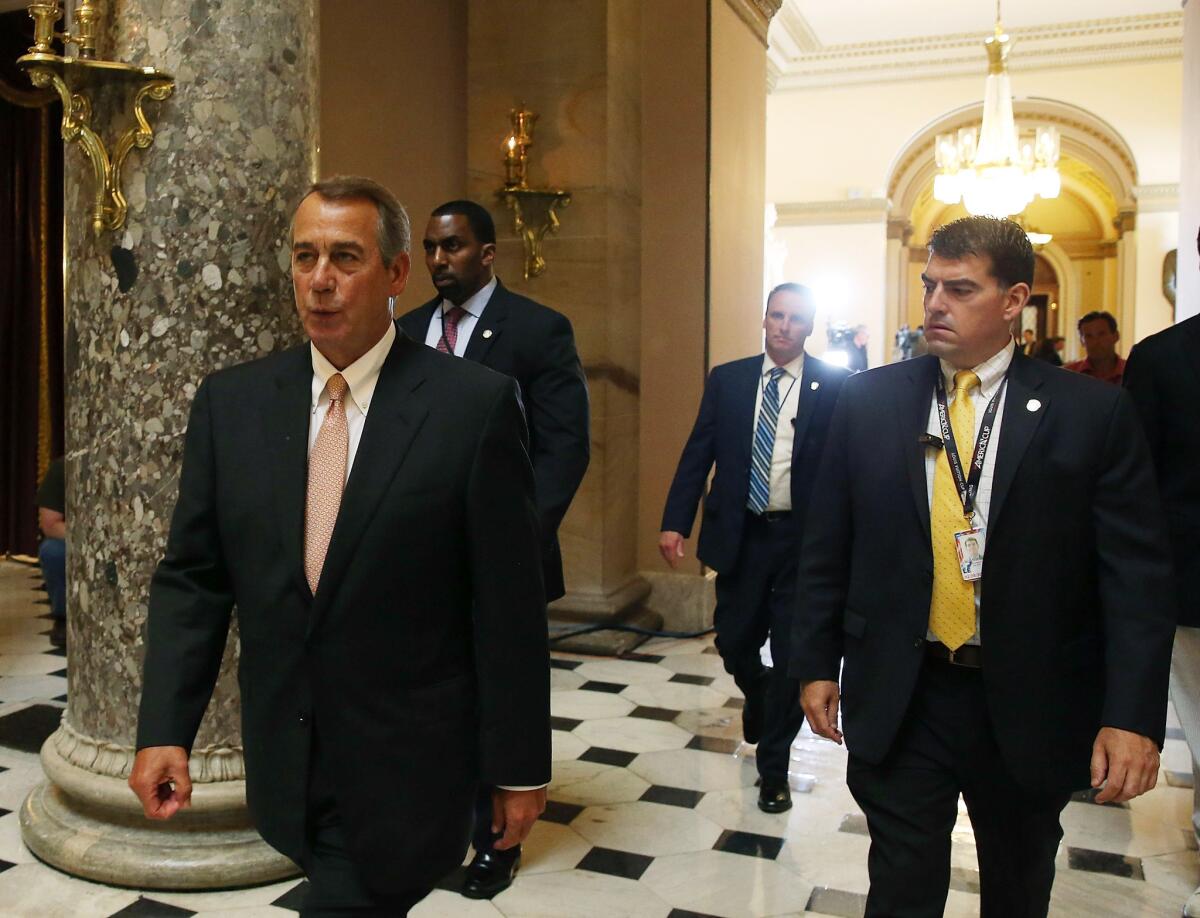Opinion: House GOP leaders are outmaneuvered again on fast-track vote

House Speaker John Boehner (R-Ohio), left, walks through the U.S. Capitol on Friday before a series of critical votes on fast-track trade legislation.
- Share via
House GOP leaders faced yet another test of their tactical abilities Friday, and once again they failed — this time, by underestimating how far Democrats would go against their own principles in order to win.
The issue this time was Trade Promotion Authority, better known as the fast-track bill. Thanks to overwhelming support within the Republican caucus, the votes appeared to be there to approve the TPA legislation even though most Democrats were opposed.
The problem was that too many rank-and-file Republicans were unwilling to accept the rest of the compromise worked out by the Senate, despite support from their own leaders. That gave Democrats the chance to sink the package — at least for the time being.
In case you weren’t following the drama on CSPAN, House leaders decided not to put the Senate-passed TPA package to a vote directly. Instead, they used a parliamentary maneuver to divide the vote into two parts, both of which had to pass in order for the measure to move forward.
One part was the TPA provisions, which would lay out negotiating objectives for trade agreements and require Congress to give an up-or-down vote to those deals under certain conditions. The other would reauthorize Trade Adjustment Assistance, an expanded unemployment insurance and retraining program for workers in companies having trouble competing with global rivals.
Left to their own devices, Republicans would have preferred to pass the TPA on its own, or possibly in tandem with a measure increasing customs enforcement, as the Senate did. They’ve not been big on the trade adjustment program because some conservatives complain that it’s “ineffective and wasteful.” And if Congress does nothing, the program will expire at the end of the year.
But in exchange for letting TPA move forward, Senate Democrats demanded that the trade adjustment program be renewed. And not trusting House Republicans to go along with the deal, these same Democrats insisted that the renewal be included in the TPA measure itself, not advanced in a separate bill.
Here’s where the House Democrats’ gamesmanship came in.
First, Democrats balked at the Senate’s proposal to cover part of the $2.9 billion cost of trade adjustment assistance by trimming future reimbursements to Medicare providers by some $700 million. GOP leaders agreed to replace the Medicare savings with something that looks like a gimmick — increased enforcement of tax laws — as part of a separate bill. But prodded by Minority Leader Nancy Pelosi (D-San Francisco), Democrats voted en masse against the trade adjustment portion of the package anyway as a way to stymie the TPA.
“Our people would rather have a job than trade adjustment assistance,” Pelosi said on the House floor, glossing over the fact that the program is designed to help people obtain jobs. “If TAA fails, the fast-track bill is stopped. ... I will be voting against the TAA to get a better deal for the American people.”
With the vast majority of House Democrats following Pelosi’s lead, the TAA portion of the bill was defeated, 126-302. That effectively mooted the House’s subsequent vote to approve the TPA portion, 219-211. The House then amended and approved the separate customs enforcement bill, 240-190.
It’s tempting just to blame (or credit, if you’re anti-TPA or anti-free trade) Democrats for the results, which were a major setback for the Obama administration and its trade agenda. But consider this: About 125 of the Democrats currently in the House voted to renew the trade adjustment program three years ago, compared to 40 on Friday. Had the Democrats produced 125 votes for the TAA Friday, it still would have fallen short because Republicans voted by almost a 2-1 margin against that portion.
By contrast, 191 Republicans voted for the TPA provisions. Had that many Republicans voted for the trade adjustment section, it would have passed easily, and the package would have gone to President Obama to sign.
In other words, the House GOP leadership couldn’t persuade Republicans to back a program they dislike in order to pass a bill that they strongly support, while Democrats happily voted against a program they cherish in order to block TPA.
The vote was a big win for organized labor, which vehemently opposes free-trade agreements, and for lawmakers who believe stopping trade deals will somehow turn back the clock on globalization.
But as House Ways and Means Committee Chairman Paul Ryan (R-Wis.) pointed out before the vote, the rest of the world is moving full-speed ahead to promote global trade through regional deals that lower barriers to exports and imports. Since fast-track authority elapsed in 2007, Ryan said, other countries have negotiated 100 trade agreements, and “the United States was party to zero of them.”
“As a result, barriers to American products have grown higher,” Ryan warned. “Every single day we do nothing to open these markets, we lose, and the rest of the world gets those jobs. ... The rulebook on how the global economy works is being written right now. The only way for us to be in the game to write the rulebook is through trade agreements.”
House Speaker John Boehner (R-Ohio) moved Friday to have the House reconsider its vote on the TAA portion of the bill. Unless Democrats relent, he’ll need to persuade close to 90 members of his caucus to flip from “nay” to “yea” on the program.
Good luck with that, Mr. Speaker.
Follow Healey’s intermittent Twitter feed: @jcahealey
More to Read
A cure for the common opinion
Get thought-provoking perspectives with our weekly newsletter.
You may occasionally receive promotional content from the Los Angeles Times.







